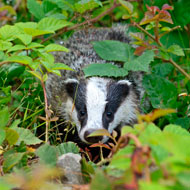
Additional licences have been granted to 11 counties across England
Following the government’s announcement that additional badger control licenses are to be granted to parts of Cheshire, a council in the county has decided to prohibit badger culling on its land.
Last week the government announced that it will be granting 11 additional licences for badger control to parts of Devon, Wiltshire, Somerset, Dorset and Cheshire. The move is part of a series of measures aimed at preventing the transmission of Bovine TB in England.
According to Farmer’s Weekly, Cheshire East Council said it would not allow badger culling to take place on its land where it had the power to prevent it from happening.
“The council is aware of the significant problem that bovine TB has caused for farmers in Cheshire, for the rural economy and for the area’s wildlife,” said a Cheshire East Council spokesman.
“It works closely with government agencies and other parties to understand the issues. The council is aware of control measures that are to be introduced in Cheshire, within the scope of national policies and practice. The council will not engage in the culling of badgers on land under its direct control.”
Cheshire Wildlife Trust is reported to be “very happy” that Cheshire East Council has made the decision to ban badger culling on its land. In a statement, the organisation said that it remains opposed to the cull on the basis that scientific evidence suggests that culling is unlikely to make a significant improvement in cattle infection rates.
‘It is also not known what proportion of this disease in cattle arises from badgers. Our view is it is better to concentrate on vaccination of cattle in the long-term, and increased biosecurity on land and the vaccination of badgers in the short-term as more effective means of control,’ said Cheshire Wildlife Trust.
‘We will not be giving permission for a badger cull take place on our reserves.’



 The Federation of Independent Veterinary Practices (FIVP) has announced a third season of its podcast, Practice Matters.
The Federation of Independent Veterinary Practices (FIVP) has announced a third season of its podcast, Practice Matters.